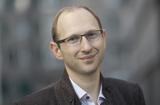Emotions are at the heart of the mind

For his work on emotions and their influence on cognitive functions, psychologist David Sander was awarded the Latsis Prize 2013. Passionate about experiments and technology, he brings together ideas from a variety of disciplines. By Catherine Riva
"Fantastic" is a word David Sander uses frequently when talking about his working environment at the University of Geneva, the collaboration with his mentors or his colleagues. "Scientifically, I'm on cloud 9," he sums up his enthusiasm.
At only 37 years of age, he already has an impressive career to look back on: professorship, director of NCCR "Affective Sciences", popular science writer and author of a children's book about emotions. The National Latsis Prize 2013 has now been added to this array of achievements.
His research combines ideas from a variety of disciplines including the humanities and social sciences, neurosciences, information technology, business studies and psychology. "I am convinced that psychological research can benefit from the conceptual analyses of philosophy just as much as from an improved understanding of neural mechanisms," he says.
A passionate experimenter
David Sander is a passionate experimenter and loves employing various technological approaches such as imaging techniques, psychophysiology, functional MRTs, olfactometry and virtual reality. At the Geneva Emotion Research Group, he has a laboratory in which complex experiments on emotions and their impact on cognitive functions - such as decision-making, memory and attention span - are conducted.
He is not troubled by the question of whether using imaging techniques of the brain is in contradiction to the key tenets of psychology: "If we can learn more about the human mind, I do not see why we should reject this information. In fact, it is the underlying rationale of the affective sciences to bring together the various disciplines that address the emotions."
Psychology and applied mathematics
As a teenager, David Sander already knew he wanted to become a researcher. In 1996, two years after simultaneously starting degrees in psychology and applied mathematics, he moved to Lyon where Olivier Koenig offered a degree in cognitive sciences. "For me, this varied approach to cognitive processes was more interesting than psychoanalysis," he remembers. "Olivier Koenig remained my mentor till the completion of my doctoral thesis. In collaboration with him, I started to apply this approach also to emotions."
But how can we identify mechanisms that influence emotions and derive predictive models? To master that challenge, David Sander is taking a closer look at the evaluation process by which we rate the affective value of events. "We only develop emotions if we consider an event important," he explains. In 2003, he caused a bit of a stir when he published an article in which he questioned the generally accepted role of the amygdala.
At the time, this almond-shaped structure in the brain was thought to be the "centre of fear". But, already as a doctoral student, David Sander developed a contrary hypothesis suggesting that the amygdala might have a much broader function: it might help us to establish the relevance of events and let us know "what is important to us in terms of our aims, values and current well-being".
This hypothesis put the model of basic emotions, developed by the American psychologist Paul Ekman, in doubt. Apart from his work on lies, known to TV audiences thanks to the series "Lie to Me", Ekman also postulated the existence of basic emotions, each of which is rooted in a system of its own. This theory is based on the observation that certain facial expressions are recognised by all humans independent of their cultural background. David Sander's new hypothesis of the amygdala places emotions in a larger context - at the heart of our mind, as he likes to put it, to emphasise just how special they are.
Emotions support the memory
"There is a close relationship between emotions and cognitive processes," he is convinced. "Emotions support our memory: most people remember what they did on 9/11 but only very few remember what they did the day after. Decisions made in a highly emotional state are considered to be irrational; but with hindsight they often prove to be very reasonable. Emotions also seem to be able to direct our attention to things that are relevant for us."
David Sander has conducted research in this area since he started working at the Faculty of Psychology and Educational Sciences of the University of Geneva in 2002. "In Geneva, I was able to collaborate with two great scientists: Klaus Scherer, evaluation theorist, and Patrik Vuilleumier, expert on the connection between the emotional brain and attentiveness."
At present, Sander and his colleagues are exploring the five components which all emotions share: physiological reaction, tendency to act, evaluation, expression (face, voice and body) and subjective feelings. Their projects explore phenomena such as the processes triggered by emotions in the brain, how smells trigger emotions and how social factors influence emotions. And they are by no means at the end of their journey of discovery: "The children with whom I talked for my book project wanted to know why we cry when we are sad," he remembers. "I still have no answer to that question."
(From "Horizons" 99, december 2013)
David Sander
David Sander, born 1976 in Paris, is professor at the Faculty of Psychology and Educational Sciences at the University of Geneva, where he is in charge of the Centre of Emotion Research. In addition, he is director of the National Centre of Competence in Research "Affective Sciences". After completing his studies in psychology, applied mathematics and cognitive sciences in Paris and Lyon, he came to Geneva in 2002. He is married and has two daughters.
National Latsis Prize
Every year, the SNSF awards the National Latsis Prize, worth CHF 100,000. The prize is awarded to researchers who are not yet 40 years old and is one of the most prestigious science prizes in Switzerland.